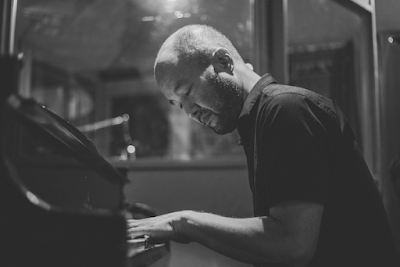 |
| Art Hirahara: Good Company: PosiTone |
Art Hirahara is making his mark as a rising star on the piano. This Bay Area raised musician attended Oberlin Conservatory of Music and received his degree in Electronic and Computer Music. He continued his education at the California Institute of Arts where he was mentored by the late bassist Charlie Haden, the pianist David Roitstein, and the progressive trumpeter Wadada Leo Smith amongst others. As a leader and sideman Hirahara has worked with a list of impressive artist including trombonist Michael Dease, bassists Boris Kozlov and Linda May Han Ho , drummers Rudy Royston and Akira Tana, saxophonists Donny McCaslin and Don Braden, trumpeters Josh Lawrence and Alex Sipiagin and vocalist Stacey Kent to name just a few.
Hirahara's relationship with the record label Posi Tone, now in its thirteenth year, started with his first recording with them, Noble Path, from 2011. If you track this musician's musical output since then, you are witnessing the personal growth of Hirahara, as the pianist's playing blossoms with ever increasingly more expansive expression, additional mastery of nuanced subtlety and space, and a continued sense of confidence that comes with maturity.
On the latest release, Good Company, Hirahara continues to explore the possibilities of how three tonally different musicians can interact creating their own palette of colors and textures to great effect. This piano trio is both bass less and drum less and it still manages to create some remarkably beautiful and creative music. This trio includes the jazz/blues guitarist Paul Bollenback, known for his tasty work with late B3 master Joey DeFrancesco, and backing up tenor titan Stanley Turrentine and the trumpeter/flugelhornist Ron Horton who has worked extensively with the bassist Ben Allison, the saxophonist Michael Blake and the late pianist Frank Kimbrough. With no traditional rhythm section, these three musicians find a common ground of expression on a series of thirteen diverse compositions that make up this recording, four from Hirahara, three from Bollenback, three from Horton, and one each from Thelonious Monk, Andrew Hill and Antonio Carlos Jobim.
Art Hirahara : (Photo credit unknown)
The opener, Bollenback's swaying ballad "Shambolic," is just gorgeous and opens with some piquant guitar lines, deft piano accompaniment and a sensitive piano solo, and some empathetic Art Farmer inspired flugelhorn lines that just grabs you. Bollenback's guitar work is a marvel of understatement.
Andrew Hill's "Laverne" is an angular piece that shows how this trio can navigate a chicanery with aplomb and class. Hirahara skillfully holds the bass less group together with his left hand during Bollenback's solo and the guitarist does the same when its comes to Hirahara's turn to improvise on the melody. Horton's horn floats above the music like a free bird in flight above the fray, always still keeping tabs of the action. Impressive interplay, indeed.
Paul Bollenback:(photo credit unknown)
The contemplative Monk tune "Ugly Beauty" is given a ethereal opening by Hirahara's haunting piano lines, accentuated by Horton's slurred trumpet lines that hang in the air like a cumulus cloud, with Bollenback's oscillating guitar notes underscore making this reconstructed opening memorable. These guys are hard wired into each other and it shows. Hirahara's piano is melodic and expressive but never overstated, and just so unselfishly supportive of the music that it allows his two bandmates to shine. A rendition of Monk's classic that is true to the composer's intent while still finding its own creative way into being one of our favorite renditions.
Ron Horton (photo credit unknown)
There is a pop feel to Horton's "Sinatra Breeze" that brings some lightheartedness to this music. Hirahara carries the bouncy rhythm and the three contribute to the melodic stroll of this one. Paul Bollenback's "Psalm" is a short hymn that finds the trio creating a somber reverence and his "Songline" is like a dance that promises hope and joy. Horton's trumpet leads the declaration, Hirahara opens it up with an inspired solo that raises the energy level, and Bollenback's guitar offers multiple ideas from various guitar traditions.
"The Shadowist" is the first of Hirahara's compositions we hear on the album. The three follow the complex lines that ascend and descend in unpredictable patterns. The pianist finds his like-minded band mates are able to negotiate this musical puzzle with aplomb, first in sync and later in counterpoint to each other. As the rhythmic drive becomes more identifiable, the three artists find their own way to making individual contributions to the music.
Hirahara's "SoHo Down" is the pianist's attempt to create his own urban inspired hoe down. A free expression to a traditional, folk inspired jig-like dance music piece.
Jobim's "As Praias Desertas," which translates from the Portuguese into "the beaches deserted now" is a bossa nova. The trio plays this Brazilian inspired romantic song with sensitivity and skill. Led by Horton's plaintive and fluid flugelhorn, Bollenback's honey-toned hollow bodied guitar lines and Hirahara's beautiful piano work, this one is like a mini-vacation.
The rapid "Everywhere, All At Once," and shifting "Drop and Drag" two other Hirahara compositions, unite this empathetic trio with athletic music that challenges and inspires these guys. Horton's expressive ballad "Full Moon Over Lisbon" is a must hear and the Americana inspired "Home" another Horton composition, proves these guys continue to find common ground in each others musical visions and finish this emotive and imaginative album. Art Hirahara's Good Company is well worth a listen.


